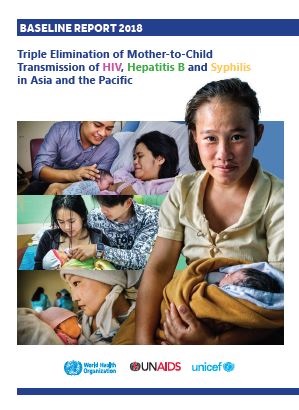

The Regional Framework for the Triple Elimination of Mother-to-Child Transmission of HIV, Hepatitis B and Syphilis in Asia and the Pacific 2018-2030 upholds
the vision that every infant should be free of HIV, hepatitis B and syphilis. The framework presents an integrated and coordinated appoach towards the goal of achieving and sustaining triple EMTCT, emphasizing the principle of people-centred
care and a human-rights-based approach for all women, children and their families, by promoting collaboration among programmes addressing RMNCH, HIV, hepatitis, sexually transmitted infections and immunization.
Triple EMTCT interventions
accessed through RMNCH services include: preventing unintended pregnancy; early antenatal care to allow effective case detection during pregnancy; rapid diagnosis; timely and appropriate treatment in pregnancy as well as during and after childbirth;
and partner testing and treatment. Closing gaps, avoiding duplication and identifying missed opportunities will improve the quality and efficiency of service delivery and result in better outcomes.
The Baseline Report 2018 Triple Elimination of Mother-to-Child Transmission of HIV, Hepatitis B and Syphilis in Asia and the Pacific looks
at data from 40 countries in the Asia Pacific region, including: Afghanistan and Pakistan, 11 countries in the WHO South-East Asia Region, and 27 countries in the WHO Western Pacific Region (areas in the Western Pacific Region under the responsibility
of other Member States are not covered). The data presented on RMNCH and triple EMTCT indicators provide both a situational analysis and a baseline for measuring further progress towards the 2030 SDG and EMTCT targets and an opportunity
for challenges and gaps to be identified and addressed.




